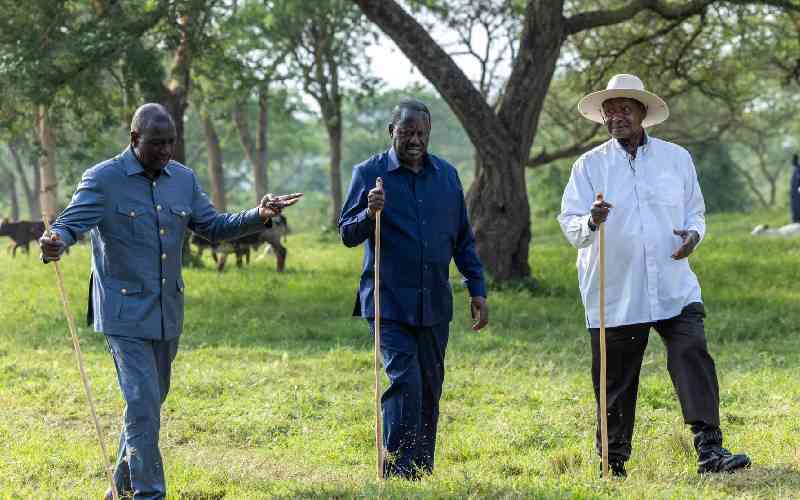
The tussle between Kenya and Tanzania that has seen the two countries restrict access to airports and tourist sites to local operators has taken a new turn, with Tanzania taking the matter before the East African Community (EAC).
The matter is expected to feature prominently at the bloc’s Council of Ministers meeting this week, which is also when Tanzania’s President Jakaya Kikwete takes over chairmanship of the EAC from President Uhuru Kenyatta.
In a statement issued by Tanzania’s Ministry of East African Co-operation last week, the country has asked for more time to involve all stakeholders in a review of a bilateral agreement that it has used to deny Kenya-registered tour vans access to its national parks and airports since 1985.
The request follows a recent directive by Kenya’s Cabinet Secretary for East African Affairs, Commerce and Tourism Phyllis Kandie that saw Kenya begin to implement the 1985 agreement. She said the ban would remain in place until a long-term solution on the agreement is found.
But the EAC’s private sector lobby, the East African Business Council, has called on both countries to implement the Common Market Protocol (CMP), which calls for the free movement of people, goods, services and capital.
Primarily saddened
“The Government of Tanzania is primarily saddened by the decision of Kenya [to ban tour vans) as it does not create nor does it equate with the goodwill of the Treaty establishing the East African Community to honour dialogue, compromise and consensus in reaching decisions,” said Harrison Mwakyembe, the minister for East African Co-operation, in a statement.
But Kenya denied banning Tanzania’s vehicles, saying it only implemented a treaty that has been in existence for 30 years.
“When the 1985 bilateral treaty was signed, Tanzania implemented it to the full, but Kenya did not. It was hoping Tanzania would reciprocate the gesture. For 30 years, Kenya has not implemented it, until now,” Ms Kandie said.
She added that Tanzania was given time to discuss the matter, but is yet to tell Kenya how far discussions have gone.
In his statement, Dr Mwakyembe said his government is discussing the agreement and would now take the matter to the EAC Secretariat.
“The issue of rectifying the agreement between two countries that has been in existence for over 30 years is no simple matter for two ministers with a deadline of three weeks to discuss,” he said.
“The Government of Tanzania will continue with discussions that have begun, involving all stakeholders until a decision is reached, which will be presented to Kenya through the official forums of the EAC.”
He went on to explain that Tanzania will respect Kenya’s decision and that the matter should resolve the dispute between the two neighbours.
Stay informed. Subscribe to our newsletter
“Although this decree of the Government of Kenya was in compliance to a contract of 1985 involving even airports as part of tourist attractions, the Government of Tanzania will respect and comply with the order to protect the brotherhood and friendship between our countries, while we contemplate action to reduce the harassment our tourists and travellers are experiencing at JKIA.
“In addition, Tanzania will take steps to inform tourists and visitors who are interested in visiting all the tourist attractions in Tanzania to use other international airports to avoid claims and unnecessary costs.”
East African Business Council CEO Andrew Luzze has differed with the two ministers, saying bilateral agreements within the EAC have been overtaken by the enactment of the CMP.
“Guided by the provisions of the CMP, the trade remedy committees have laid down mechanisms to resolve such matters,” Mr Luzze told Business Beat.
“We also need to make it clear that the ban does not include those travelling between the two countries by both air and road. EAC partner states should respect protocols. If they had done so, this issue would not have arisen.”
[email protected]
 The Standard Group Plc is a
multi-media organization with investments in media platforms spanning newspaper
print operations, television, radio broadcasting, digital and online services. The
Standard Group is recognized as a leading multi-media house in Kenya with a key
influence in matters of national and international interest.
The Standard Group Plc is a
multi-media organization with investments in media platforms spanning newspaper
print operations, television, radio broadcasting, digital and online services. The
Standard Group is recognized as a leading multi-media house in Kenya with a key
influence in matters of national and international interest.
 The Standard Group Plc is a
multi-media organization with investments in media platforms spanning newspaper
print operations, television, radio broadcasting, digital and online services. The
Standard Group is recognized as a leading multi-media house in Kenya with a key
influence in matters of national and international interest.
The Standard Group Plc is a
multi-media organization with investments in media platforms spanning newspaper
print operations, television, radio broadcasting, digital and online services. The
Standard Group is recognized as a leading multi-media house in Kenya with a key
influence in matters of national and international interest.










